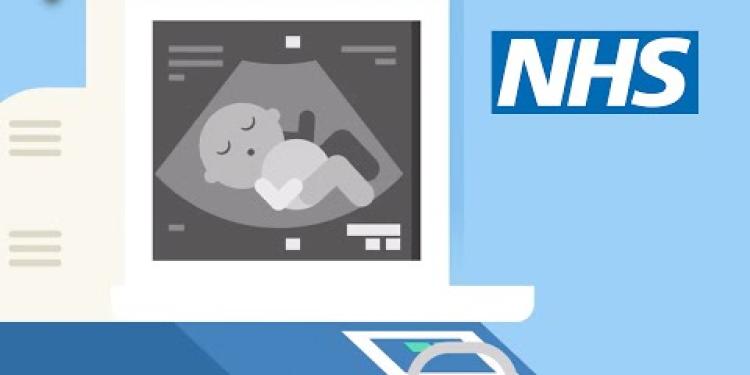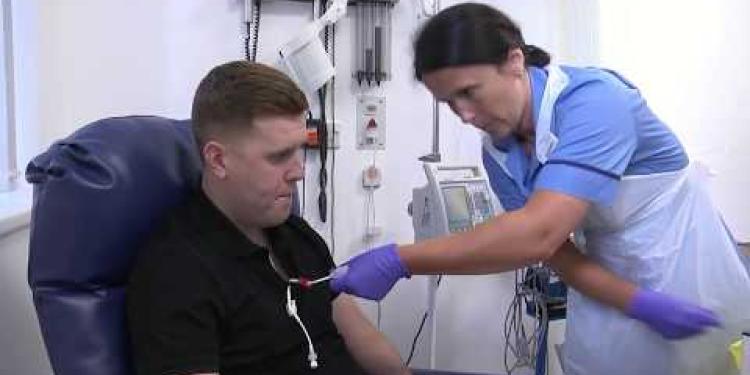Important Information On Using This Service
- Ergsy carefully checks the information in the videos we provide here.
- Videos shown by YouTube after a video has completed have NOT been reviewed by ERGSY.
- To view, click the arrow in the center of the video.
Using Subtitles and Closed Captions
- Most of the videos you find here will have subtitles and/or closed captions available.
- You may need to turn these on and choose your preferred language.
Turn Captions On or Off
- Go to the video you'd like to watch.
- If closed captions (CC) are available, settings will be visible on the bottom right of the video player.
- To turn on captions, click settings.
- To turn off captions, click settings again.
Find A Professional
More Items From Ergsy search
-

Sue Doherty on hepatitis C awareness
Relevance: 100%
-

What is the new treatment for hepatitis C like?
Relevance: 73%
-

Liver disease | NHS
Relevance: 42%
-

Children's Vaccination Schedule
Relevance: 8%
-

Screening tests for you and your baby | NHS
Relevance: 6%
-

Liver transplant - Patient experience - Part 1 (Colin)
Relevance: 6%
-

Sexually transmitted infections STIs
Relevance: 4%
-

Let's Talk Sexual Health - Home Self Testing Kits
Relevance: 2%
-

Blood Product Transfusions
Relevance: 2%
-

Let's Talk Sexual Health - Home Self Testing Kits
Relevance: 2%
-

How to treat glandular fever | NHS
Relevance: 2%
-

NHS STI (Sexually Transmitted Infections) Information Video
Relevance: 2%
Sue Doherty on Hepatitis C Awareness
Introduction to Hepatitis C
Hepatitis C is a significant public health issue affecting millions worldwide, including individuals in the United Kingdom. The virus predominantly spreads through blood-to-blood contact, posing risks to those who share needles or have received unscreened blood transfusions. Awareness and advocacy are key in combating this often silent but potentially life-threatening disease.
Sue Doherty's Advocacy Efforts
Sue Doherty is a prominent figure in Hepatitis C awareness in the UK. As a passionate advocate, Sue has dedicated her life to educating the public and supporting those affected by the virus. Her efforts include organizing awareness campaigns, participating in public forums, and collaborating with healthcare professionals to enhance prevention, testing, and treatment strategies.
Public Engagement and Education
Sue Doherty often emphasizes the importance of public engagement and education in her work. By hosting workshops, speaking at conferences, and using social media platforms, Sue aims to dispel myths and provide accurate information about Hepatitis C. Her educational initiatives focus on encouraging people to get tested and understand the available treatment options.
Support for Affected Individuals
In addition to her awareness campaigns, Sue Doherty is deeply committed to supporting individuals living with Hepatitis C. She works closely with various support groups and healthcare providers to ensure that affected individuals have access to necessary medical care and psychological support. Her empathetic approach helps to reduce stigma and foster a supportive community environment.
Conclusion
The efforts of Sue Doherty have significantly contributed to increasing Hepatitis C awareness in the United Kingdom. Her tireless advocacy and commitment to education and support play a crucial role in the fight against Hepatitis C. By continuing to raise awareness and support affected individuals, Sue inspires hope and change in the community.
Sue Doherty on Hepatitis C Awareness
What is Hepatitis C?
Hepatitis C is a sickness that affects many people around the world. It spreads through blood. You can catch it if you share needles or if you had old blood transfusions. Learning about Hepatitis C can help stop this sickness. It is serious but people can do things to stay safe.
What Sue Doherty Does
Sue Doherty helps people know about Hepatitis C in the UK. She talks about it a lot and helps people learn. Sue makes plans to teach others and works with doctors to help stop the spread of this sickness.
Talking to People and Teaching
Sue thinks it's important to talk to people about Hepatitis C. She holds classes, talks at meetings, and uses the internet to teach. Sue wants people to get checked for Hepatitis C and learn about ways to get better.
Helping People with Hepatitis C
Sue also helps people who have Hepatitis C. She works with groups and doctors to make sure these people get the care they need. Sue is kind and helps people feel better about themselves.
Final Thoughts
Sue Doherty is doing a great job of helping others learn about Hepatitis C in the UK. Her hard work helps people understand and deal with this sickness. By teaching and caring, Sue gives people hope and makes things better for them.
Frequently Asked Questions
What is hepatitis C?
Hepatitis C is a liver disease caused by the hepatitis C virus (HCV). It can cause both acute and chronic infections. In severe cases, it can lead to liver damage, cirrhosis, or liver cancer.
How is hepatitis C transmitted?
Hepatitis C is primarily transmitted through blood-to-blood contact. This can occur through sharing needles, non-sterile medical equipment, and sometimes through sexual contact or from mother to child during childbirth.
What are the symptoms of hepatitis C?
Many people with hepatitis C have no symptoms until liver damage becomes apparent. When symptoms do occur, they can include fatigue, fever, nausea, loss of appetite, jaundice, dark urine, and abdominal pain.
Who is at risk for hepatitis C?
Anyone can be at risk, but those at higher risk include people who inject drugs, those with a history of blood transfusions before 1991, healthcare workers, and people born to mothers with hepatitis C.
How can I get tested for hepatitis C?
A blood test can diagnose hepatitis C. In the UK, you can get tested through your GP, sexual health clinics, or specialist drug treatment services.
Is there a vaccine for hepatitis C?
Currently, there is no vaccine for hepatitis C. Prevention focuses on reducing the risk of exposure to the virus.
What treatments are available for hepatitis C?
Antiviral medications can cure most cases of hepatitis C. The type of medication and duration of treatment depend on various factors, including the strain of the virus and the extent of liver damage.
Can hepatitis C be cured?
Yes, hepatitis C can often be cured with antiviral medications. A sustained virological response means the virus is undetectable in the blood six months after treatment, indicating a cure.
Can I get hepatitis C from casual contact?
No, hepatitis C cannot be spread through casual contact such as hugging, kissing, or sharing food and drinks. It is only spread through blood-to-blood contact.
How can I prevent hepatitis C infection?
Preventive measures include avoiding sharing needles or other drug paraphernalia, ensuring medical equipment is sterile, practicing safe sex, and avoiding tattooing or piercing with non-sterile equipment.
What should I do if I think I have been exposed to hepatitis C?
If you think you've been exposed to hepatitis C, seek medical advice as soon as possible. Early testing and diagnosis can improve the effectiveness of treatment.
What are the long-term effects of hepatitis C?
Chronic hepatitis C can lead to serious liver conditions including fibrosis, cirrhosis, liver cancer, and liver failure. Around 20% of chronically infected individuals develop cirrhosis within 20-30 years.
Can pregnant women with hepatitis C pass the virus to their baby?
Yes, there is a risk of mother-to-child transmission of hepatitis C during childbirth, although it is relatively low. Pregnant women with hepatitis C should discuss their condition with their healthcare provider.
How does hepatitis C affect daily life?
The impact on daily life varies; some people may experience symptoms like fatigue that affect their day-to-day activities. It’s essential to follow medical advice, including potential lifestyle changes like reducing alcohol intake.
Where can I find support if I have hepatitis C?
Support is available from healthcare providers, patient groups, and charities such as the Hepatitis C Trust in the UK. These organisations offer information, advice, and support networks.
What is hepatitis C?
Hepatitis C is a sickness that hurts the liver. It is caused by a virus. The liver is an important part of our body that helps us stay healthy.
Hepatitis C can make people feel tired and sick. Some people might not feel anything at all.
If you think you might have hepatitis C, it is important to see a doctor. They can help you feel better.
If you find it hard to read, you can use tools like audiobooks or ask someone you trust to read with you.
Hepatitis C is an illness that hurts the liver. It is caused by a germ called the hepatitis C virus (HCV). You can have it for a short time or a long time. If you get very sick, it can make your liver not work well, get scars, or even lead to liver cancer.
To understand better, you can use pictures, videos, or ask someone to explain. Try reading with a helper or use reading tools that can read aloud for you.
How do people get hepatitis C?
Hepatitis C can be spread from one person to another.
Here are some ways it can happen:
- By sharing needles or syringes.
- Through contact with infected blood.
- By sharing personal items like razors or toothbrushes that have blood on them.
It's important to be careful and use clean items to stay healthy.
If you need help understanding, you can ask an adult or a doctor.
Hepatitis C is a disease you can get when blood from someone with the disease gets into your body. This can happen if you share needles, use medical tools that aren't clean, or sometimes through sex or when a mother gives birth.
What happens if you have hepatitis C?
Hepatitis C is a sickness that hurts your liver. It can make you feel very tired or sick. Sometimes, people do not feel anything at first. Here are some things you might feel:
- Tired all the time
- Pain in your belly
- Your skin or eyes look yellow
- You feel like you might throw up
- You have a fever
- Your pee is dark, like tea
If you feel like this, it is important to see a doctor. They can help you feel better. You can also use picture cards or ask someone you trust to help explain things if you need more help.
Lots of people with hepatitis C don't feel sick until their liver is hurt. When they do feel sick, they might feel very tired, have a fever, feel sick to their stomach, not want to eat, have yellow skin or eyes, dark pee, and a sore stomach.
It's a good idea to use pictures or videos to understand more about hepatitis C. You can also ask someone to read this with you. It might help to write down new words and what they mean.
Who can get hepatitis C?
Hepatitis C is a sickness that can hurt your liver.
Some people have a higher chance of getting it. You might be at risk if:
- You have shared needles or syringes.
- You received a blood transfusion before 1992.
- Your mom had hepatitis C when you were born.
- You have tattoos or piercings done with unclean tools.
- You work somewhere you might touch blood.
If you think you might have hepatitis C, talk to a doctor or nurse.
Helpful tools:
- Speak to a healthcare professional for advice.
- Use apps or videos to learn more in simple language.
Anyone can get the illness. But some people are more likely to get it. These include people who use needles for drugs, people who got blood from others before 1991, healthcare workers, and people whose mothers had hepatitis C.
How can I get tested for hepatitis C?
Do you want to know if you have hepatitis C?
Here is how you can find out:
1. Visit your doctor or nurse.
2. Ask them for a test to check for hepatitis C.
3. They might take a small amount of your blood.
Your doctor or nurse will help you understand the results.
If you need help going to the doctor, ask a family member or friend to come with you.
Remember, it is always okay to ask questions!
A blood test can show if you have hepatitis C. In the UK, you can get the test from your GP, sexual health clinics, or places that help with drug use.
Can you get a shot to stop hepatitis C?
Right now, there is no shot to stop you from getting hepatitis C.
Doctors and scientists are working to make a shot that can help.
If you are worried about hepatitis C, talk to your doctor. They can help you.
Right now, there is no shot to stop hepatitis C. To stay safe, you need to be careful not to catch the virus.
What treatments help if you have hepatitis C?
Hepatitis C is a liver illness. It means your liver is not working well.
If you have hepatitis C, doctors can give you medicine to help. This medicine can make you feel better.
Doctors will check your health and tell you the best medicine for you. It is important to take the medicine as the doctor says.
If you or someone you care for has questions or feels worried, talk to a doctor or nurse. They can help explain things better.
Remember, you can ask a friend or family member to help you understand the doctor. You can also use pictures to help you learn.
Medicine can help get rid of most cases of hepatitis C. The type of medicine and how long you need to take it depends on different things, like the kind of virus you have and how damaged your liver is.
Can hepatitis C be cured?
Yes, hepatitis C can be cured. This means doctors can give you medicine to make the virus go away.
If you have questions or need help, you can:
- Talk to a doctor or nurse.
- Ask someone you trust for help.
- Use pictures or videos that explain hepatitis C.
Yes, you can often get better from hepatitis C with special medicine. This medicine is called antiviral. If the virus is gone and doesn't come back after six months, it means you are cured.
Can I catch hepatitis C from being around people?
No, you cannot get hepatitis C from hugging, kissing, or sharing food and drinks. You can only get it if blood from a person with hepatitis C gets into your body.
How can I stop getting hepatitis C?
Here are things you can do to stay safe:
- Don't share needles or drug stuff.
- Make sure medical tools are clean.
- Use protection when having sex.
- Don't get tattoos or piercings with tools that might be dirty.
Tools that can help:
- Ask a trusted adult when you're not sure.
- Use pictures or videos to learn more.
- Use apps or websites that explain things simply.
What to Do if You Think You Have Hepatitis C
If you think you may have come into contact with hepatitis C, go to see a doctor right away. Getting tested and finding out early can help make the treatment work better.
What can happen to your body if you have hepatitis C for a long time?
Hepatitis C is a germ that can make your liver sick.
If you have it for a long time, it can hurt your liver.
Things that can happen:
- Your liver might get very sick (called liver damage).
- You might feel tired a lot.
- Your skin or eyes might turn yellow (this is jaundice).
It is important to see a doctor and get help.
Ask someone you trust to go with you to the doctor. They can help you understand what the doctor says.
Chronic hepatitis C is an illness that hurts your liver. It can cause big problems like liver damage, liver cancer, and sometimes the liver stops working properly. About 20 people out of 100 who have this illness for a long time will get liver damage called cirrhosis after 20-30 years.
Here are some helpful tools and ideas:
- Ask your doctor for simple explanations.
- Use pictures to understand how the liver works.
- Find support groups to talk with others.
Can Mums with Hepatitis C Give the Virus to Their Baby?
If a mum has a virus called Hepatitis C, she might worry about her baby. Can the virus go to the baby? Sometimes, but not always.
It's a good idea for mums to talk with a doctor about it. The doctor can offer help and advice.
Support Tools:
- Ask your doctor questions.
- Write down your worries to talk about them.
- Talk to someone you trust about how you feel.
Yes, there is a small chance a mom with hepatitis C can give it to her baby when the baby is born. Moms who have hepatitis C should talk to their doctor about it.
How does hepatitis C change daily life?
Hepatitis C is an illness. It can make you very tired. Some people may feel sick or have pain. It can be hard to do things they like.
It is important to visit the doctor. The doctor can give medicine to help you feel better. Remember to rest and eat healthy foods.
If you need help, ask a friend or family member. You can also talk to a nurse or support group. They can give you more information and tips.
How this affects you every day can be different. Some people might feel very tired, which makes it hard to do their normal things. It is important to listen to your doctor. You might need to change some things you do, like drinking less alcohol.
Where can I get help if I have hepatitis C?
You can get help from doctors, patient groups, and charities like the Hepatitis C Trust in the UK. They give you information, advice, and people to talk to who understand what you’re going through.
Useful Links
Useful links from: What is the new treatment for hepatitis C like?
- NHS - Hepatitis C The NHS guide on hepatitis C, including symptoms, causes, and treatments available for the condition.
- Hepatitis C Trust UK-based charity focusing on hepatitis C, providing information on the latest treatments and support for those affected.
- British Liver Trust - Hepatitis C Treatment British Liver Trust's detailed guide on living with hepatitis C, including new treatment options and patient support.
- NICE - Hepatitis C: Treating and Managing National Institute for Health and Care Excellence (NICE) guidelines for the treatment and management of hepatitis C.
Have you found an error, or do you have a link or some information you would like to share? Please let us know using the form below.
- Ergsy carfully checks the information in the videos we provide here.
- Videos shown by Youtube after a video has completed, have NOT been reviewed by ERGSY.
- To view, click the arrow in centre of video.
- Most of the videos you find here will have subtitles and/or closed captions available.
- You may need to turn these on, and choose your preferred language.
- Go to the video you'd like to watch.
- If closed captions (CC) are available, settings will be visible on the bottom right of the video player.
- To turn on Captions, click settings .
- To turn off Captions, click settings again.
